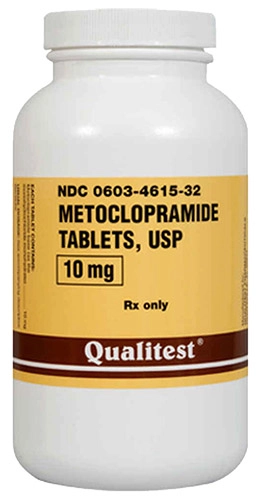The information provided here is not a replacement for a doctor. You shouldn't use it for the purpose of self-medicating but rather so you can have a more informed discussion with a healthcare professional.
This article aims to summarize the use of Reglan (metoclopramide) for lactation purposes. Feel free to jump to the chapter that concerns you most or read through each one:
- What is Reglan?
- How effective is Reglan for milk production?
- Is Reglan safe for babies and their mothers?
- How long should Reglan be taken for?
- Do I need a prescription for Reglan?
- What else is recommended to increase milk supply?
What is Reglan?
Reglan is a brand name for metoclopramide, a medication primarily used for stomach and esophagus issues.

A side effect of Reglan is that it increases the level of prolactin in postpartum mothers, a hormone that plays a role in stimulating lactation. As such it's often used off-label for the purpose of increasing milk supply.
Prolactin is an important hormone to trigger lactation postpartum. However once lactation is there, demand and supply stimulation plays a bigger role in increasing the amount of milk than the level of prolactin.
How effective is Reglan for milk production?
The effectiveness of metoclopramide to increase milk supply is questionable at best. Many scientific studies were undertaken to understand whether it is a galactagogue (i.e. a medication that increases milk supply) and none were able to conclude it did have a significant effect.
The LactMed entry on metoclopramide1 concludes that it is "of no benefit" when it comes to its effectiveness as a galactagogue. Most well-designed scientific studies come to the same conclusion.
For instance a study of 26 mothers2 compared metoclopramide to a placebo. The drug or placebo was taken for 8 days beginning within 36 hours of delivery and the total volume of milk pumped per day was recorded by the women. However there was no significant difference in milk production between the two groups. The conclusion was that metoclopramide was no better than placebo to increase milk volume pumped.
All this being said, metoclopramide does increase prolactin hormone levels in postpartum mothers3. This means that while it may not work to increase milk supply, it can be useful to induce lactation when there is none.
If your purpose is to increase milk supply, you're probably better off taking herbal supplements specifically designed for that purpose such as Milk Boost Tea.


Among its ingredients is Dong Quai, a root also known for its wide range of health benefits for women. It also contains Wang Bu Liu Hang, famous for their ability to facilitate lactation.
Is Reglan safe for babies and their mothers?
Metoclopramide is believed to be generally safe for breastfed babies when their mother takes it as a medication. This is because very little of the dosage taken by the nursing mum actually makes it to their breast milk1.
The same cannot be said for their mothers. A common side effect of metoclopramide is depression which makes it badly suited for postpartum mothers since they're already at risk of postpartum depression. A survey of breastfeeding women taking metoclopramide found that 12% reported suffering from depression!4
There are numerous other negative side effects for breastfeeding mothers such as tiredness, nausea, headache, diarrhea, dry mouth or breast discomfort. In fact in a survey of breastfeeding mums all reported experiencing adverse reactions from metoclopramide.5
In general metoclopramide is especially contraindicated for nursing mothers who suffers from depression, a seizure disorder, asthma or high blood pressure.
How long should Reglan be taken for?
If your purpose is to trigger an increase in prolactin hormones, studies found that this typically occurs within 3 weeks of taking metoclopramide3.
In general metoclopramide shouldn't be taken for longer than 12 weeks.
After the initial prolactin hormone trigger, it is the demand and supply equilibrium that determines the level of breast milk production. Some supplements such as Milk Boost Tea can help too. There shouldn't be a need to take metoclopramide if your lactation is triggered already as its effect on prolactin hormone won't help you increase your milk supply.
Do I need a prescription for Reglan?
Reglan (metoclopramide) is a prescription medicine. You need to consult with your doctor to obtain it.
However if you ask your doctor for Reglan for the purpose of increasing your milk supply, you probably won't get your prescription since the evidence of its effectiveness is so flimsy. Most doctors would probably rather suggest you use galactagogue foods, herbal supplements such as Milk Boost Tea as well as more frequent pumping or breastfeeding.
Doctors might prescribe Reglan for relactation or for the purpose of inducing lactation, besides its on-label effects for the stomach and the esophagus. This is because those are issues helped by a higher level of prolactin hormone. Concretely the following cases might be helped by Reglan (metoclopramide):
- You're an an adoptive mother who wishes to nurse their adopted baby
- You're a mother who had to stop nursing and you wish to lactate again (i.e. relactation)
- You wish to practice adult breastfeeding
What else is recommended to increase milk supply?
Domperidone is another medication that has arguably more effect than Reglan when it comes to increasing milk supply. It is however as of yet not approved by the U.S. FDA because of its side effects on the heart. As such it is not available to buy in the U.S. It is approved in other countries such as Canada.
Breast stimulation and the general supply and demand concept remains what most lactation specialists would recommend to increase milk supply. There are also several herbal supplements known to work very well for many women such as Milk Boost Tea.
Sources:
1. Drugs and Lactation Database (LactMed) [Internet]. Bethesda (MD): National Library of Medicine (US); 2006-. Metoclopramide. [Updated 2021 Feb 15]. Available from: https://www.ncbi.nlm.nih.gov/books/NBK501352/
2. Shannon Fife, Prabhcharan Gill, Michael Hopkins, Carol Angello, Sue Boswell & Karl M. Nelson (2011) Metoclopramide to augment lactation, does it work? A randomized trial, The Journal of Maternal-Fetal & Neonatal Medicine, 24:11, 1317-1320, DOI: 10.3109/14767058.2010.549255
3. Osouli, S., Mirghafourvand, M., Seyedi, R. (2017). The Effect of Metoclopramide on Prolactin Levels in Breastfeeding Mothers: A Systematic Review and Meta-Analysis. International Journal of Pediatrics, 5(10), 5827-5838. doi: 10.22038/ijp.2017.24678.2083
4. Hale TW, Kendall-Tackett K, Cong Z. Domperidone versus metoclopramide: Self-reported side effects in a large sample of breastfeeding mothers who used these medications to increase milk production. Clinical Lactation. 2018;9:10–7.
5. Bazzano, A. N., Cenac, L., Brandt, A. J., Barnett, J., Thibeau, S., & Theall, K. P. (2017). Maternal experiences with and sources of information on galactagogues to support lactation: a cross-sectional study. International journal of women's health, 9, 105–113. https://doi.org/10.2147/IJWH.S128517

